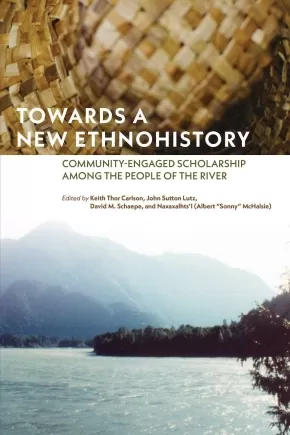Albert (Sonny) McHalsie Naxaxalhts’i
Naxaxalhts’i, also known as Dr. Albert “Sonny” McHalsie is a historical researcher and cultural interpreter.
Naxaxalhts’i has worked for the Stó:lō as a researcher in cultural heritage and aboriginal rights and title issues since 1985. He currently acts as the cultural advisor on the Treaty Negotiation Team for the Stó:lō Xwexwilmexw Treaty Association. He was a co-author of the book I Am Stó:lō: Katherine Explores Her Heritage (1997) – focusing on his family and his daughter. He contributed to and served on the editorial board of the award-winning publication A Stó:lō Coast Salish Historical Atlas (2001). He was also the author of We Have To Take Care OF Everything That Belongs To Us in Bruce Miller’s Be OF Good Mind (2007). He also wrote the foreword in Keith Thor Carlson’s The Power Of Place, The Problem Of Time (2010).
His areas of expertise include Halq’eméylem Place Names, Fishing, and Stó:lō Oral History. He has also been featured in many television documentaries for the CBC, APTN and Omni. He is a member of the Shxw’ow’hamel First Nation, the proud father of two girls and six boys, and has six grandchildren. He continues to fish at his ancestral fishing ground at Aseláw in the Stó:lō Five Fishery in the lower Fraser River canyon.
Books (1)
Synopsis:
Towards a New Ethnohistory engages respectfully in cross-cultural dialogue and interdisciplinary methods to co-create with Indigenous people a new, decolonized ethnohistory. This new ethnohistory reflects Indigenous ways of knowing and is a direct response to critiques of scholars who have for too long foisted their own research agendas onto Indigenous communities. Community-engaged scholarship invites members of the Indigenous community themselves to identify the research questions, host the researchers while they conduct the research, and participate meaningfully in the analysis of the researchers’ findings.
The historical research topics chosen by the Stó:lō community leaders and knowledge keepers for the contributors to this collection range from the intimate and personal, to the broad and collective. But what principally distinguishes the analyses is the way settler colonialism is positioned as something that unfolds in sometimes unexpected ways within Stó:lō history, as opposed to the other way around.
This collection presents the best work to come out of the world’s only graduate-level humanities-based ethnohistory fieldschool. The blending of methodologies and approaches from the humanities and social sciences is a model of twenty-first century interdisciplinarity.
Reviews
“At a time when Indigenous sovereignty has come to the fore, this volume sets the ‘gold standard’ for ethical scholarship and provides a roadmap and manifesto for sensible and sensitive decolonization.”– Chris Friday, Professor of History, Western Washington University
“The strength of the collection is its appreciation for and attention to interpreting history with reference to Stó:lō interpretative frames.” – Tyler McCreary, BC Booklook
“In a time when many scholars are looking to decolonize their approaches to research—especially when working with Indigenous communities—this book stands as a clear exemplar of community-engaged research and demonstrates how it can be done well.”– Jennifer Megan Markides, University of Calgary, Qualitative Research in Education
“Exemplifies a new, transdisciplinary approach to ethnohistory, in which the researcher recognizes not only the legacy of settler colonialism in Canada, but also the subjectivity and relativity of their own views and western knowledge as a whole. This new ethnohistory aims to work with the community at all levels of research and form and sustain relationships that last long after fieldwork is conducted. Its hope is to produce scholarship that is cutting edge, complex, accessible and relevant to members of the community.”– Daniel Sims, NICHE
“Settler scholars concerned with disciplinary crises need look no further than this excellent anthology for models of respectful intercommunity engagement, radical methodology and pedagogy, and a paradigm for solidarity work that chooses to develop respectful relationships over moribund agonizing.”– Madeleine Reddon, Canadian Literature
Educator Information
Table of Contents
Introduction
Ch. 1—Kinship Obligations to the Environment
Ch. 2—Relationships
Ch. 3—Crossing Paths
Ch. 4—Stó:lō Ancestral Names, Identity and the Politics of History
Ch. 5—Disturbing the Dead
Ch. 6—Food as a Window into Stó:lō Tradition and Stó:lō-Newcomer Relation
Ch. 7—’Bringing Home all That Has Left’
Ch. 8—Totem Tigers and Salish Sluggers
Ch. 9—’I Was Born a Logger’
Ch. 10—’They Are Always Looking for the Bad Stuff’
Ch. 11—Next Steps in Indigenous Community-Engaged Research
Additional Information
304 pages | 6.00" x 9.00"







